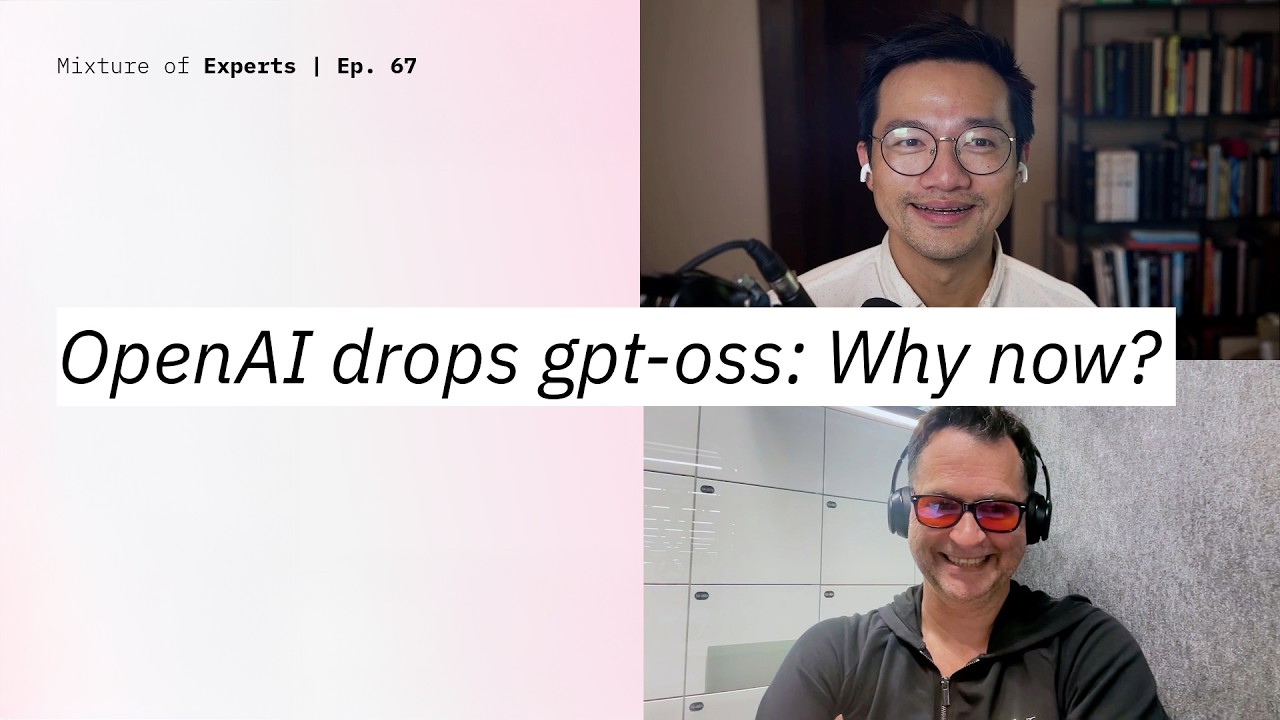In this episode of Mixture of Experts, Tim Hwang and panelists discuss recent AI advancements including OpenAI’s open-source GPT-OSS models, DeepMind’s immersive 3D world generator Genie 3, Anthropic’s Claude Code rate limiting due to infrastructure costs, and Meta’s vision for personal superintelligence integrated with AR hardware. They explore the challenges of balancing openness, sustainability, and monetization while envisioning diverse future AI applications that enhance productivity and user experience across multiple devices.
In this episode of Mixture of Experts, Tim Hwang and a panel of experts including Chris Hay, Kaoutar El Maghraoui, and Bruno Aziza discuss the latest developments in artificial intelligence, focusing on OpenAI’s release of GPT-OSS, DeepMind’s Genie 3, Anthropic’s Claude Code rate limiting, and Meta’s vision of personal superintelligence. The conversation begins with the announcement of OpenAI’s open-source models, a 120 billion and a 20 billion parameter model, designed to run efficiently on consumer-grade hardware. The panel debates whether OpenAI will transition fully to open source by 2030, with opinions varying from a hybrid approach to skepticism about a complete shift due to competitive and monetization pressures.
The discussion then moves to DeepMind’s Genie 3, an immersive generative model capable of creating 3D virtual worlds on demand. The panelists highlight the transformative potential of this technology for gaming, enterprise applications, and new ways of consuming and interacting with information. While acknowledging the current high computational costs and early stage of the technology, they express optimism about future improvements that could make real-time, on-demand 3D world generation more accessible to both consumers and professionals.
Next, the conversation addresses Anthropic’s Claude Code and its recent implementation of rate limits on its $200 monthly pro plan due to the high usage and associated infrastructure costs. The panel explores the sustainability challenges of running large-scale AI models, emphasizing the need for ongoing optimization techniques such as token caching, compression, and efficient hardware utilization. They also discuss the evolving economics of AI services, where companies are moving from free or low-cost offerings to more structured pricing models that reflect usage and value.
The final topic centers on Meta’s release of an essay on personal superintelligence, outlining a vision where AI acts as a personal assistant to help individuals achieve their goals and enhance their lives. The panel contrasts Meta’s approach with those of OpenAI and Anthropic, noting different emphases on productivity, safety, and empowerment. They also discuss the role of hardware, such as Meta’s AR glasses, in shaping the future of AI interfaces, predicting a multi-device ecosystem where various form factors coexist to deliver personalized AI experiences.
Throughout the episode, the experts emphasize the rapid pace of AI innovation and the complex interplay between technological capabilities, business models, and user adoption. They highlight the importance of balancing openness with competitive advantage, managing infrastructure costs, and envisioning diverse futures for AI integration into daily life. The conversation reflects both excitement and caution as the industry navigates these transformative developments.
